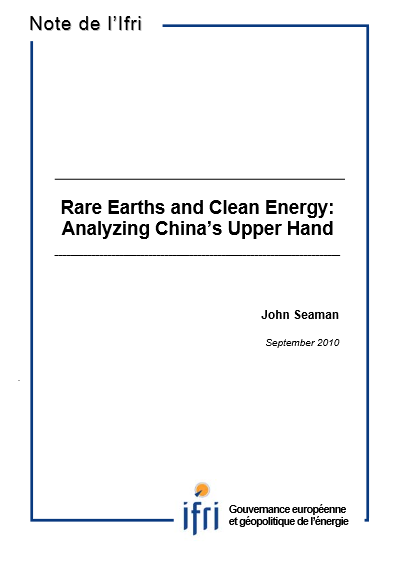Rare Earths and Clean Energy: Analyzing China's Upper Hand

An ominous resource crunch in the so-called “rare earth elements” is now threatening the development of a number of key industries from energy to defense to consumer electronics. As key components in the latest generation of technologies, including specialized magnets for windmills and hybrid cars, lasers for range finders and “smart” munitions, and phosphors for LCD screens, demand for these rare metals is expected to grow rapidly in the years to come.
But decades of underinvestment in the mining and separation of these elements across the globe has left the industry ill-prepared to meet this growing demand. Over the years, only China has recognized the strategic significance of these resources and has succeeded in gaining a near monopoly on production, currently churning out 97% of the world’s rare earth oxides. Faced with problems of its own, and eager to use its resource advantage to master higher levels of value-added production of rare earth-dependent products, China has increasingly limited the rest of the world’s access to these raw materials. This only complicates what was already projected to be a problematic resource shortage.
This issue demands a higher quality of public debate. Rare earth consuming countries outside of China have only recently become aware of their dependence and started to take stock of the risks. Time is of the essence.
Bringing new supplies online to meet growing demand is a long, complicated and risky process but is nevertheless necessary to ensure the development of high tech industries, notably clean energy. Accessible reserves of rare earths do exist outside of China and mitigating the effects of the looming shortage requires opening up these reserves to production. Yet, as the Chinese experience attests, there are substantial risks to the environment associated with mining and separating rare earths. Care must be taken to ensure responsible mining practices across the globe. Longer-term solutions, such as recycling programs, increased efficiency in resource use and the development of alternatives to rare earths are important endeavors and should be pursued, but they should not be substitutes for developing rare earth supplies outside of China today.

Available in:
Regions and themes
ISBN / ISSN
Share
Download the full analysis
This page contains only a summary of our work. If you would like to have access to all the information from our research on the subject, you can download the full version in PDF format.
Rare Earths and Clean Energy: Analyzing China's Upper Hand
Related centers and programs
Discover our other research centers and programsFind out more
Discover all our analyses
RAMSES 2024. A World to Be Remade
For its 42nd edition, RAMSES 2024 identifies three major challenges for 2024.
France and the Philippines should anchor their maritime partnership
With shared interests in promoting international law and sustainable development, France and the Philippines should strengthen their maritime cooperation in the Indo-Pacific. Through bilateral agreements, expanded joint exercises and the exchange of best practices, both nations can enhance maritime domain awareness, counter security threats and develop blue economy initiatives. This deeper collaboration would reinforce stability and environmental stewardship across the region.

The China-led AIIB, a geopolitical tool?
The establishment of the Asian Infrastructure Investment Bank (AIIB) in 2016, on a Chinese initiative, constituted an attempt to bridge the gap in infrastructure financing in Asia. However, it was also perceived in the West as a potential vehicle for China’s geostrategic agendas, fueling the suspicion that the institution might compete rather than align with existing multilateral development banks (MDBs) and impose its own standards.
Jammu and Kashmir in the Aftermath of August 2019
The abrogation of Article 370, which granted special status to the state of Jammu and Kashmir (J&K), has been on the agenda of the Bharatiya Janata Party (BJP) for many decades.







